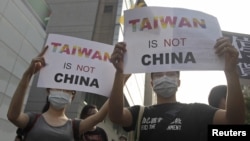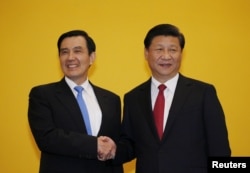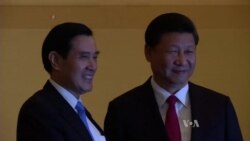A historic meeting between the leaders of Taiwan and China Saturday was rich in symbolism, but short on substance. Criticism of the trip and Taiwan President Ma Ying-jeou’s performance at the meeting with China's president Xi Jinping is already building at home. And while the leaders of Taiwan and China say the meeting has nothing to do with the island’s upcoming elections, it is already becoming a key topic on the campaign trail.
Core values
The top contender in Taiwan's upcoming presidential elections, opposition Democratic Progressive Party candidate Tsai Ing-wen says one key thing the president did not highlight during the meetings or in his remarks to the press after the closed-door talks concluded, was the island's democratic values, freedoms and the will of the Taiwan people.
Speaking at a rally in Taiwan’s central city of Taichung Sunday, Tsai Ing-wen urged voters to use their ballots to not only oust Ma’s party from the presidential office, but legislature as well.
“This president still does not understand why his public approval rating is so low. The reason why it is so low is because he does not listen to the public, he does not communicate with the public,” she said. “He does not even understand the true meaning of democracy.”
Tsai said that while Ma talks constantly about the Republic of China, Taiwan’s official name, he did not mention it during his meetings with Xi. Taiwan and China do not officially recognize one another and official titles have long been a stumbling block to higher-level talks.
During their meeting in Singapore, a third country, Taiwan and China’s leaders referred to themselves as cross-strait leaders and “mister” instead of president. No official flags were flown at the hotel where the two met.
Concerns
In Taiwan, some felt the meeting was unfairly tilted in China’s favor.
"I felt like Ma Ying-jeou avoided talking about Taiwan as a country and the status of Xi Jinping was obviously higher,” said Hsieh Yi-lun, a 20-year old student. “That's my feeling."
Others said it felt as if Ma Ying-jeou was not even prepared for the talks and that his key concern was about securing a place for himself in history.
“I think he sacrificed the expectations of some Taiwanese people, or maybe there were nearly no expectations," said Chang Chen-hao, a 25-year-old worker in Taipei.
WATCH: Related video report by William Ide
President Ma Ying-jeou’s meeting with Chinese leader Xi Jinping comes just weeks before voters in Taiwan take to the polls. On January 16, voters will elect a new president and legislature.
His announcement of the meeting, the first between the leaders of China in 66 years, occurred just days before it took place and has triggered small street protests in Taipei.
Ma’s Nationalist Party is trailing in the polls and it could loose both the legislature and presidential office for the first time, and that is a concern for China.
Warnings
Beijing has used the historic meeting and state media to urge voters in Taiwan to oppose independence and what it calls separatism.
President Xi said the two leaders had agreed to meet to avoid repeating the tragedies of the past.
An article in the Communist Party’s People’s Daily Sunday said the only reason why cross-strait relations have seen such progress since Ma came into office was because the two have jointly opposed Taiwan independence and accepted a so-called 1992 consensus and that there is one China, albeit with different interpretations.
The article said that while Tsai is milder than the DPP’s previous president who served from 2000-2008, she has never stated her adherence to the so-called 1992 consensus.
“There is overwhelming concern that she may do something to promote" Taiwan Independence" once elected,” it said.
China regards democratically-ruled Taiwan as part of its own territory and has never renounced the use of force as an option if the island formally declares independence.
Ma’s trip to Singapore has raised concerns at home from opposition politicians such as Tsai. They argue that Ma did not even notify the legislature about the trip before making the trip and that the historic trip has hurt Taiwan’s democracy. Ma has said that he is willing to deliver a report on the talks to lawmakers.
Some information for this report came from Reuters.








